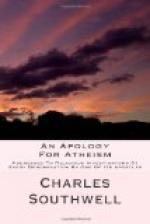’What Coleridge meant by the motto (all Theology depends on mastering the term nature) concerns us not. We appropriate the motto, but we do not profess to appropriate it in the same sense as Coleridge appropriated it. Every man must appropriate it for himself. Coleridge perceived what every thinking mind has perceived—the difficulty of believing in two self-determining powers, viz., God and Nature, as also the consequences of regarding them as identical. If Nature be one power and God another power, and if God be not responsible for what Nature does, then Nature is a self-subsisting God. If God and Nature be esteemed one universal existence, this is Pantheism, which is denominated an accursed doctrine by the disciples of Sectarianism, and formed no part of the creed, of the great dialectician of modern times. The attempt to separate God from Nature will mistify the clearest head: not even Coleridge could wade the depths of this vulgar Theology. Is there any man who can rest satisfied in the faith of two independent powers who exist together in any other sense than the two polar energies of a magnet, which are really one? No: and men are afraid to regard them as one. On the one hand they are puzzled to understand an unintelligible absurdity, and on the other, they are afraid to admit a simple truism which leads to the abolition of all ceremonial forms, and lip professions of religion, and is execrated by priests and their accomplices on this very account. We do not pretend to understand anything. Every subject whatsoever is too high, too deep, and too broad for us. But coming into a world where men act upon certain modes of reasoning, which are unsatisfactory to our minds, we battle immediately with these men, like an animalcule thrown into a glass of water amongst other animalcules of opposite principles, and in doing so we act from the impulse within which is our sole authority—that impulse within is the preference we give to a mode of reasoning which begins by regarding the existing of every kind and, degree as a ‘perfect unity,’ and making the unity, responsible for every mode—the cause of every mode.’ [49:1] That is to say, dealing with it as what it is, the only existence; the one, or all and in all. Can Atheists object to that? No, surely, for they uniformly thus reason with respect to Nature; and unless traitors to their own principles, cannot object to Pantheistical philosophy as here laid down. Atheists say, Nature never had an Author—so do Pantheists of the ‘Shepherd’ school. Atheists say Nature is at once the womb and grave and cause and effect of all phenomena—so do they. Atheists say ‘death is nothing, and nothing death;’ all matter breathing the breath of life—so do they. Indeed, notwithstanding their talk about God and Devil, they think Nature both, which amounts to denying both. Can Atheists do more? or can Pantheists do so much without themselves being Atheists?




